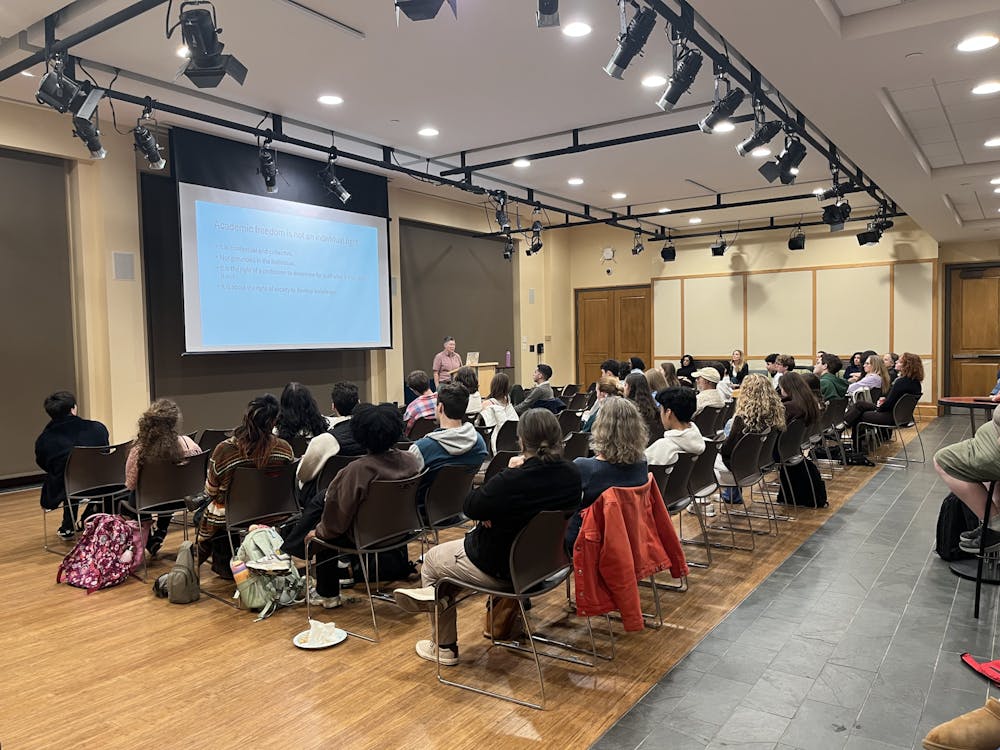Chase Strangio, a practicing attorney with the American Civil Liberties Union, discussed the state of transgender rights in the webinar "Fighting for Transgender People’s Right to be Themselves" on Oct. 20 as part of WILL* and women, gender and sexuality studies program "Audacious Voices" speaker series.
Strangio said he had worked on several important cases pertaining to LGBTQ+ rights, including the landmark Obergefell v. Hodges in 2015, the result of which legalized same-sex marriage. He has been a practicing lawyer for 10 years, he said.
Professor of WGSS Kathleen Skerrett introduced Strangio at the beginning of the webinar. Strangio later mentioned that Skerrett had been a professor at Grinnell College, which he attended, and had taught him a few courses.
Strangio said he applied to the ACLU in 2012 after working as a paralegal for the Gay and Lesbian Alliance Against Defamation, or GLAAD, he said. Strangio then discussed the LGBTQ+ cases he has worked on and the progress for the LGBTQ+ community, especially the transgender community, has seen in the courts.
Strangio said after the Obergefell v. Hodges decision was made, the ACLU was unprepared for what came next.
“There was an influx of attacks [on transgender people] with no preparation,” Strangio said, referencing the backlash the LGBTQ+ community, especially transgender people, received after the Obergefell v. Hodges decision."
Strangio said he had seen an influx of cases trying to take away transgender people’s rights and anticipates he will see more in 2021 after the Supreme Court’s decision on Bostock v. Clayton County on June 15 this year. The decision protects gay and transgender people from workplace discrimination.
The webinar then moved into a Q&A portion, during which attendees had the opportunity to ask Strangio questions. When discussing how litigating cases and promoting change connect, Strangio said, “95% of the time, law and organizing can’t be co-equal.” He continued on about the frustrations he has about how the law and social change should be separate entities and how many times, the legal aspects tries to overpower the change.
Strangio said he hoped his work as an attorney would give people power and resources to enact social change.
An attendee asked Strangio whether he experienced any burnout fighting for transgender rights both as a lawyer and as someone who identifies as transgender himself.
“I've incredibly compartmentalized [certain aspects of the job]," Strangio said, "There is a certain level of detachment that the project of law demands.”
Strangio also emphasized the importance of voting not only in the upcoming U.S. presidential election but in local and senate elections. He also briefly talked about the nomination of Amy Coney Barrett to the U.S. Supreme Court and how much of the 2020 presidental election will play out in the courts. Strangio said many cases concerning LGBTQ+ rights were being brought up to the Supreme Court in the upcoming months and years.
Enjoy what you're reading?
Signup for our newsletter
One of these cases Strangio mentioned was Grimm v. Gloucester County School Board, a case concerning transgender students' rights to use bathrooms for the gender with which they identify. Strangio said the case made it to the Supreme Court in 2016 but was sent back to the lower courts after Betsy DeVos and Jeff Sessions revoked certain protections after President Donald Trump's 2016 election, making aspects of the case moot.
Strangio discussed how courts are trying to broaden the scope of religious exemptions for LGBTQ+ discrimination and the government's involvement in these exceptions, such as in Fulton v. City of Philadelphia. Strangio said the case would be heard by the Supreme Court later this year and would determine whether the government can contract agencies that discriminate against LGBTQ+ people, specifically in the foster care system.
Strangio also said that, despite courts across the country making more progressive decisions concerning transgender rights, court cases were a limited way to enact social change. He emphasized the importance of building and organizing through state-level lobbying, as local representatives also play a major role in protecting LGBTQ+ rights.
Strangio is one of Time magazine’s 100 most influential people of 2020 and received the Stonewall Award in 2020 for his work for the LGBTQ+ community as Skerrett mentioned in Strangio's introduction.
The Audacious Voice Speaker series by WILL* and WGSS will host Loretta Ross at 7 p.m. on March 24, 2021, for a presentation titled "Reproductive Justice as Human Rights." The format for the presentation is still being decided and students and faculty can register at https://will.richmond.edu/speaker-series/index.html.
Contact news writer Westen Doran at westen.doran@richmond.edu.
Support independent student media
You can make a tax-deductible donation by clicking the button below, which takes you to our secure PayPal account. The page is set up to receive contributions in whatever amount you designate. We look forward to using the money we raise to further our mission of providing honest and accurate information to students, faculty, staff, alumni and others in the general public.
Donate Now



